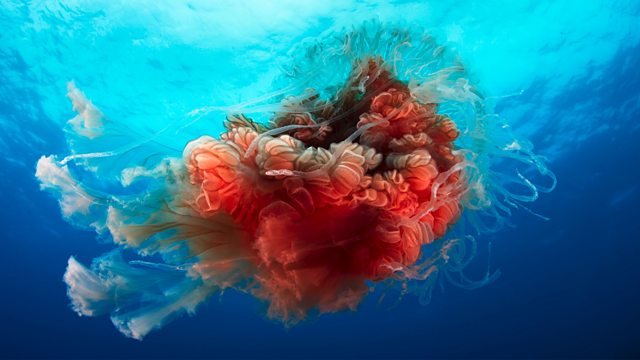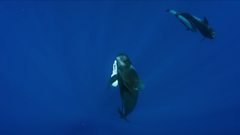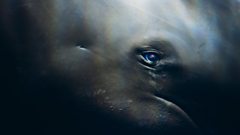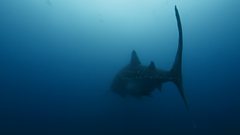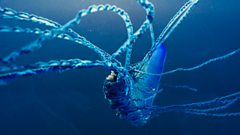Big Blue
The wildlife documentary series narrated by David Attenborough explores a vast ocean desert where sperm whales must dive 1,000 metres just to feed.
The big blue is the world's greatest wilderness, far from shore and many kilometres deep. It's a vast marine desert where there is little to eat and nowhere to hide. Yet it's home to some of the biggest and most spectacular creatures on earth.
This episode reveals what it takes to survive in this savage and forbidding world. We witness feats of incredible endurance, moments of high drama and extraordinary acts of heart-wrenching self-sacrifice.
Every animal in the big blue must find their own unique way to survive. Sperm whales have the largest brains in the world. They live for 80 years, and we are only now beginning to learn the extraordinary complexity of their language of clicks - thought to coordinate the whole family in everything from childcare to hunting. With special pressure-proof cameras, we witness record-breaking feats of endurance as they hunt for squid a kilometre down into the abyss.
Many smaller creatures find sanctuary in this great wilderness. Only recently have we begun to solve the mystery of where baby turtles disappear to in their early years. They leave the crowded waters of the coast and head to the open ocean, where they use floating debris like logs as life rafts. Here they remain until adulthood, adrift on the high seas in relative safety away from coastal predators.
Over half of all animals in the open ocean drift in currents. Jellyfish cross entire oceans feeding on whatever happens to tangle with their tentacles. The jelly-like Portuguese man-of-war can harness sail power to fish with its deadly tentacles. Sometimes there is a brief explosion of food in this marine desert, but ocean hunters must be fast to make the best of this bonanza. We witness super pods of up to 5,000 spinner dolphins racing to herd vast shoals of lanternfish, briefly caught at the surface where it is thought they spawn. New aerial footage reveals, for the first time, the truth to a centuries-old sailors' legend of the 'boiling seas' - the spectacular feeding frenzy of 90kg tuna and dolphins smashing through the lantern fish shoals turning the sea white with foam.
Raising your young in this great wilderness is a huge challenge. The episode follows two very different ocean voyagers that show amazing care. We get closer to solving the mystery of where the biggest fish in the sea, the whale shark, gives birth. The pregnant females make an epic journey across the Pacific to the Galapagos Islands. Scientists now think it might be here that the pregnant females give birth to their pups in the safety of the depths. And in the freezing south Atlantic, a pair of ageing wandering albatrosses give their all to raise their very last chick.
Yet even in the big blue, thousands of kilometres from land, there is evidence of human activity. An estimated eight million tons of plastic is dumped into the oceans every year. Globe-spanning currents carry it into the heart of every ocean, often with tragic consequences. In the Atlantic waters off Europe we follow a family of pilot whales whose calf has recently died. One possible cause of death is poisoning by its own mother's contaminated milk. As plastic breaks down it combines with other pollutants that are consumed by vast numbers of marine creatures. In top predators like pilot whales, the toxic chemicals can build up to lethal levels.
Last on
More episodes
Previous
Next
Clips
-
![]()
Pilot whales and plastic pollution
Duration: 02:15
-
![]()
Death of a pilot whale calf
Duration: 02:15
-
![]()
The mystery of the whale shark nursery
Duration: 03:12
-
![]()
The deadly tentacles of the Portuguese man o鈥檞ar
Duration: 02:07
Music Played
-
![]()
Brian Cross
Boom Boom (feat. Inna, Brian Cross, Inna)
Credits
| Role | Contributor |
|---|---|
| Narrator | David Attenborough |
| Executive Producer | James Honeyborne |
| Series Producer | Mark Brownlow |
| Producer | John Ruthven |
| Production Manager | Katie Hall |
Broadcasts
- Sun 19 Nov 2017 20:00
- Sun 26 Nov 2017 16:55
- Tue 5 Dec 2017 03:00
- Tue 6 Nov 2018 15:45麻豆社 Two except Scotland
- Tue 23 Apr 2019 20:00
- Wed 24 Apr 2019 02:00
- Sun 1 Mar 2020 15:25麻豆社 One Wales & Wales HD only
- Sun 1 Mar 2020 16:25麻豆社 One except Wales & Wales HD
- Sun 6 Dec 2020 17:00麻豆社 One except Wales & Wales HD
- Mon 8 Jan 2024 19:00
- Tue 9 Jan 2024 02:00
- Sat 3 Feb 2024 19:00麻豆社 Two Wales & Wales HD only
- Sun 25 Feb 2024 10:35
- Sun 7 Jul 2024 10:35
- Sun 28 Jul 2024 13:50麻豆社 Two Wales HD & Wales only
- Fri 13 Sep 2024 19:00
- Fri 4 Oct 2024 22:20麻豆社 Two Wales HD & Wales only
Download an Oceans poster and discover more about life in the oceans
Visit OpenLearn, the OU鈥檚 home of free learning, to learn more about the oceans
Get involved with ocean conservation
Get ideas on how you can help sea life.
Dive deeper to see how Blue Planet II was made
Read articles and watch clips showing how we created the series
Download the podcast
Join us for a deeper look into each episode of Blue Planet II
